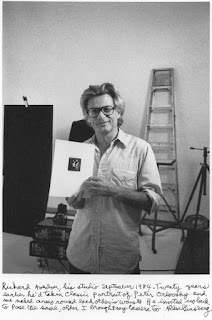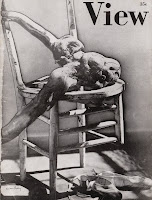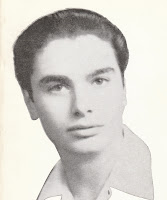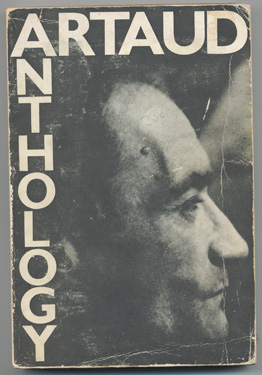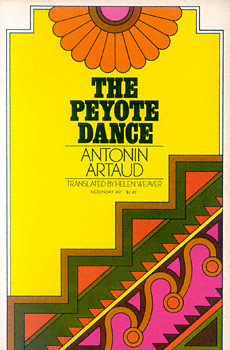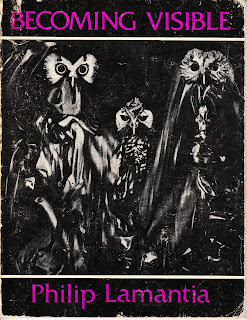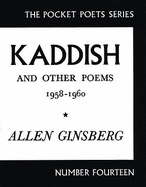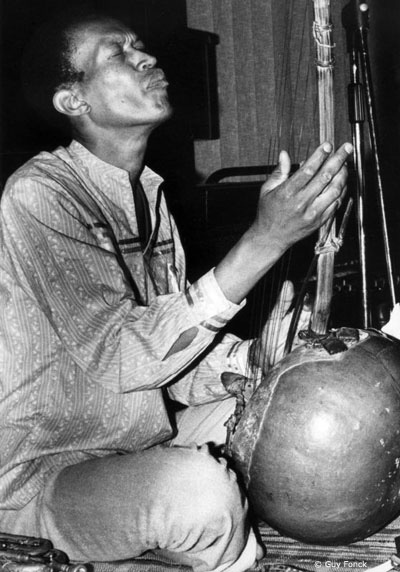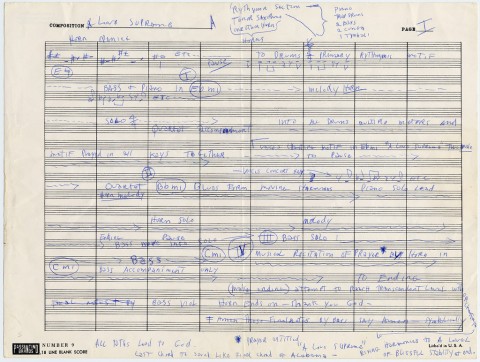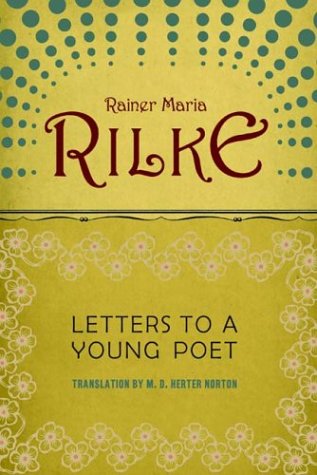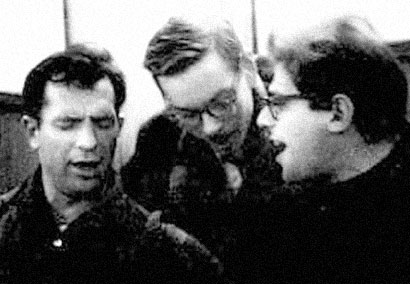![]()
[
Philip Lamantia (1927-2005) - Photographed in 1981 by Chris Felver] H
appy, immensely happy, to be able to announce the publication (long-awaited publication) of The Collected Poems of Philip Lamantia. For other Lamantia-on-the-Ginsberg blog postings, see here, here and here and here and here,
![]() On this occasion, we feature...
On this occasion, we feature...
from "The Literary History of the Beat Generation", Allen's 1982 Naropa lecture series - his seminar on Philip Lamantia - a full transcription (the audio is available here (starting approximately thirty-one-and-three-quarter minutes in) and continuing here)
![Philip Lamantia's picture Philip Lamantia's picture]() AG: So..we'll start with Lamantia. How many know Lamantia? - I brought up a whole bunch of Lamantia's books, didn't I? - How many know Lamantia? [Allen looks around the class] - you do and you do and you do - How many don't know Lamantia at all? - [Allen turns to student] - You know, I guess, (G), don't you?
AG: So..we'll start with Lamantia. How many know Lamantia? - I brought up a whole bunch of Lamantia's books, didn't I? - How many know Lamantia? [Allen looks around the class] - you do and you do and you do - How many don't know Lamantia at all? - [Allen turns to student] - You know, I guess, (G), don't you?
Student (G): A little bit.
AG: I think last term, last time I went around I did some but I'll probably be repeating some of those because it's of that same period, if you can do it, if you can take it. I think I mentioned that he was the one person who went to New York during the time that the Surrealists were in residence during World War II, around.. near the Museum of Modern Art (they were being patronized by the Museum of Modern Art, they had a home, in a sense, and (by) galleries, Peggy Guggenheim had a gallery. Then there was the magazine, View, and there was another magazine edited by Andre Breton, the chief Surrealist calledVVV) and Lamantia had, at the age of thirteen, come to New York and met all the Surrealists and stayed over in the office of View, and published poems in View magazine and VVV, so when he was thirteen (which would be, I guess (19)45 - (19)46 maybe?
![]() Student: He was born in 1927
Student: He was born in 1927
AG: Yeah - (19)27, so in 1944.. let's see, from 27 to 44 is what?
Student: (19)44, he'd be seventeen.
AG: Yeah - I was at Columbia and I opened a copy of VVV magazine and read this (not knowing who he was, but it was Philip Lamantia) - [Allen begins reading Lamantia's "Hermetic Bird"] - "Hermetic Bird" - "The sky is to be opened/This plundered body to be loved/this lantern to be tied/ around the fangs of your heart/ Lost on a bridge/going across oceans of tragedy/across islands of inflammable women/I stand/with my feathers entangled in your navel/with my wings opalescent in the night/and shout words heard tomorrow.." - Exactly. Here we are! - "shout words heard tomorrow/ in a little peasant cart/ of the seventeenth century" - that last image is very similar to (Arthur) Rimbaud - that little "peasant cart", carriages at the bottom of the lake, "little peasant cart/ of the seventeenth century"..."Breath by breath/ the vase in the tomb/breaks to give birth to the roving Sphinx....".... "On the pillars of nicotine/ the word pleasure is erased by a dog's tongue" - that's pretty good! - "On the pillars of nicotine/ the word pleasure (in italics) is erased by a dog's tongue/On the pillars, the bodies are opened by keys/the keys are nailed to my bed/to be touched at dawn/to be used in a dream"..."you and I/ will ride over the breast of our mother/who knows no one/who was born from unknown birds/ forever in silence/ forever in dreams/forever in the sweat of fire.." - So there's all these opposites, Surrealist, so that's pretty good, and that was recognized by Breton and others, and published by Breton (and Breton was, like, the arbiter of what was really truly Surrealist and what wasn't)![]() Student: It's amazing.
Student: It's amazing.
AG: It's quite amazing..but..I still remember..when I was.. (so I'm a year older than him), walking, about (19)44 it must have been, around Columbia, going to the Art Library, Fine Arts School, wandering around the Art Library, and seeing these big huge beautiful Surrealist magazines with many colors and pop-ups and strange Pop Art things in them already, seeing this poem and remembering , "at the bottom of the lake, at the bottom of the lake", the repeated line stuck in my head for..(well) thirty years or so - but, to tell you the truth, this is the first time I've found it again - I still remember it. I've looked through this book.. This is a book put out by Don Allencalled Touch of the Marvelous, which is Lamantia's early poems, published very later, after he did a lot of other things, published 1974, and taking in a period from..well..what?..(19)43?... there's a little introduction by a fellow named Stephen Schwartz, who was a Surrealist and friend of Lamantia, saying, "Let us not forget that Surrealism first reached the English language via prodigies, the English David Gascoyne in the nineteen thirties" - who was the one and only Englishman, American-English speaker, or English-English speaker, who was admitted to the Surrealist circle and hung around the cafes with them in the 'thirties - "Philip Lamantia in San Francisco in 1943, but while Gascoyne went on to adopt the role of an academic romantic" - and wound up in a bug-house for about ten years, totally silent, and just came out in the last few years - "Lamantia chose the difficult, precipitously exalted path of permanent dissidence. Furthermore, I'm willing to insist that among his.." - this is very Surrealist sort of rhetoric - "that among his "spectacular" post-war contemporaries (Kerouac, Ginsberg, et al), Philip Lamantia alone assimilated the lessons of the revolution in jazz, that other secret society, that coincided with his appearance". So, later, (Lawrence) Ferlinghetti published Collected Poems, or,Selected Poems, 1943-1966. There's a couple of copies here, so, if anybody wants to look through them. There's also.. some stuff is in the Don Allen anthology, if anybody wants.. just give me these back when you're done, though![]()
Student: That man who published him, Nicholas Calas, was he a poet?
AG: Yeah. He published (him) in View.. Greek.. he was a critic - and poet, critic and poet. Actually, ..let me see.. when he was young, very young, he was very beautiful, tall, beautiful, and gay, and had an affair with Brion Gysin (which is rarely known), (William) Burroughs' friend, and so he was a gilded..
Student: Who's this?
AG: A guy named Nicholas Calas (who came out here the first few years at Naropa, and taught here) - He's now very old and quite frail
Student: And straight.
He's been straight for years but he had his "gilded youth", so to speak, in Paris (he's Greek, originally) and in his gilded youth in Paris, he was also a member of that Surrealist circle, and then, was a sort of charter-member of some of the aesthetic intellectual circle of the (19)40's and (19)50's around Partisan Review, which, at that time, was a very big intellectual influence.
Student: He liked Gregory (Corso)'s work a real lot.
AG: Yeah, Calas - [to Student] - did you have him? or did you know him?
Student: Yeah I got into a conversation with him once but he was pretty recluse.. I got to talk to him on the street. He was talking about Gregory (Corso)'s work which he went off about six minutes on
AG: Well, Gregory, I think, is one of the few poets who is a natural Surrealist.
Student: That's what he said. He said he was the greatest Surrealist poet.
AG: Really? It's amazing that he would recognize that. Well, he's a great critic, you know. So, if he says so, it means something! - It means, you know, that's a real artist. I didn't know that. Well, Lamantia also likes Gregory, you know, and admires him. Except that they won't talk to each other. They pass each other on Grant Street in San Francisco! But I think that Gregory behaved so badly some, a few, times - drunk, or knocked-out on goofballs, or valium, or something, and Lamantia's very proud (and he's also an ex-junkie, but now settled down, and a little heavier weight), and he's always been a little bit more withdrawn, retired, hermetic (hermetic, I should say). When everybody else is running around in the cafes, he's home studying Hermes Trismegistus, Egyptian hieroglyphs, or something, cooking up some theory of the Golden Section, looking up archaic hermetic lore (because that's his real interest). At one point, he was on junk, and then, at another point, he went intoa kind of Catholic period, returned to a Catholic period, and then rejected that, renounced Surrealism and accepted Christ, and then renounced Christ and accepted Surrealism. Then, a couple of years ago, he and I had a big fight at Ferlinghetti's house. Ferlinghetti and I, and LeRoi Jones [Amiri Baraka], and (William) Burroughs, and Gregory (Corso), and everybody, had been to Italy, to a big.. 1979..to a big poetry-reading, twenty-thousand people. There was sort of a riot when a bunch of Anarchists tried to break it up and really start a fight and hurt people. So, Lamantia was very disapproving of our being there (because it was sponsored by the Communist city government and he thought it was like a sell-out to the Commies, to the State (not so much the Communists, as to the State). And also, finally, the Surrealists and the Communists have always had some kind of a..
Student: Grudge match?
AG: Well, matched for a while, and then a grudge match..because at one point.. Well, actually, Breton was a great admirer of (Leon) Trotsky, and spent time with Trotsky, and has a whole book on him, or essays on him, and so was totally Trotsky-ite, finally, by the (19)40's, I guess, around that time, maybe even earlier?
Student: Both had such a dogmatic approach, and Breton was always,"You must do this if you're going to be a Surrealist!"...
AG: Well, there's a little bit of that in Lamantia (or in Stephen Schwartz's introduction, I don't know if you caught it, the tone, the insistence). So.. On the other hand, he loved Jack (Kerouac) a lot, they got along well, and I think I mentioned that, in 1952 (or 1950, 1951, I think), there's a very interesting situation of Partington Ridge in Big Sur with Lamantia, Kerouac and (Neal) Cassady, all taking peyote together in a stone house of the late Jaime de Angulo, an anthropologist-poet-story-writer, who was a friend of (Ezra) Pound and Robinson Jeffers and Henry Miller, the whole Big Sur group.
Student: When was this? is it in books?
AG: Kerouac describes it a little bit in Visions of Cody. There's one-and-a-half pages of brilliant writing on it in that. There's probably something in Desolation Angels but I'm not sure...or maybe it would be in.. I don't know where else it would appear. I don't know who else has written about it. It's in letters. It's in Kerouac's letters to me I think it's mentioned, and to, probably, letters to (William) Burroughs by Kerouac.
Well, let's get on to the actual texts, finally. One line I liked (page 39 0f Selected Poems).. did any of you get to read any of this? in advance? - Raise your hand if you did. Anybody not familiar with it at all? Are these books unavailable or something? They were in the library, or two of them..Student: No, they are walking off the reserve shelf.
AG: There is a back. You have to go in the back and look. It's the same thing, except you go in the back. It's dismaying, I don't know why she [the librarian] did that, but..Student: Somebody took the.. [rearranged the]..
AG: Which?
Student: Philosophy, Psychology (section)..
AG: Ah, oh, it's really hard..Well..
(So). At the end of a poem called "Intersection", there's one great line. ["my house in the cracks of the pavement !"] - A lot of this was very much influenced by grass. This.. the dates on these I'm not quite sure actually, let's see if they've got them.. (19)48-(19)61 - Trance Ports, it's called (the section of the book is called Trance - T-R-A-N-C-E - Ports, ports of call in trance, also transports - (a) pun. So this section of the book would be our own time, or there's the time we're studying, so I'll just go through some of that section. It's at the end of one poem, an earlier one - [Allen begins reading] - "I'm thinking then/ a chain of words/ breaking at the fistfall of words.. - it's page 38 - "I'm thinking then/ a chain of words/ breaking at the fistfall of words/ I'm thinking green funnels of light.." - he's high on grass - "I'm thinking green funnels of light/sifting white water/flown in blue/that cut a breast of honey to free the air/ Here/ take my breath/out of all the cities I haven't seen/from quick pleasures I haven't noticed/ from a room without doors I wouldn't want to leave..." - So it's very contradictory, the opposite of ..sort offunny negatives - "out of all the cities I haven't seen..."..."..In a secret room I dream/ the eye of the father closing/the eye of the mother closing/ the eye of the daughter/ opened" - almost naturalistic, the old folks die, the young folks live, (it) could make sense if you wanted, or, it could just be Surrealist movies - "They look to the winter sun/ that lifted a golden reef into the clouds..."...."I'm thinking/ going down the street" - "going down the street" becomes Surrealist - "I'm thinking/ going down the street" - and there's some kind of tea-high, grass head - "I'm thinking/ going down the street/not long to be seen/ not wide enough to be missed/ my house in the cracks of the pavement!" - that's a very interesting image, the idea of, you know, somebody - everybody's gotten high? - like your house is in the cracks of the pavement, that your attention is so microscopic that you get lost in the cracks in the pavement, you know - "My house is in the cracks of the pavement" - also, it's like.. there's a Whitmanic statement too, you could say, that my house... or "Saxifrage is my flower that splits the rocks"- or a (William Carlos) Williams statement - What would that mean? sort of like a free spirit, or American Indian spirit, or free spirit, not exactly a hobo spirit, but a spiritual spirit, that inhabits all places and goes everywhere and doesn't have a home, doesn't have a bourgeois home, doesn't have a middle-class home, has no habitation but the cracks in the pavement - or it could be...It's like "I pump him full of lost watches" - My permanent home is in the times cracking up the city. It could be..
Student: Saxi-frage means break-rock.![DSCN0521 DSCN0521]() AG: Yeah, uh-huh. I didn't know that - frag, yes, frag-ment.
AG: Yeah, uh-huh. I didn't know that - frag, yes, frag-ment.
Student: Sax is rocks
AG: Sax. Is that Latin?
Student: Yes.
AG: What's the noun?
Student: Saxum
AG: Saxum? And what's the verb?
Student: Fractar - Infraction
AG: Fractare?
Student: I think Frag you get Frago Frago or Fraga Fraga... Frago Fraga or Fractus
AG: Because Fragere (frangere) is the infinitive -
Student: Right,
AG: Saxifrage. That's a line of Williams, you know. "Saxifrage - exclamation-point -is my flower that splits the rocks". You know, the little things in the pavements of Rutherford, New Jersey, the little flowers. That's probably earlier, and..![]() "Man is in Pain". Now this one on page 48 was published in the first City Lights Journal. So now we're beginning to catch up to the integration of all the groups.. The City Lights Journal was a magazine edited, I guess in (19)54, by.. it still continues, but the first issue was edited by Ferlinghetti and a fellow named Peter Martin who, until about a month ago, ran a bookstore called The New Yorker Bookstore up-town at 89th Street in New York City at Broadway.
"Man is in Pain". Now this one on page 48 was published in the first City Lights Journal. So now we're beginning to catch up to the integration of all the groups.. The City Lights Journal was a magazine edited, I guess in (19)54, by.. it still continues, but the first issue was edited by Ferlinghetti and a fellow named Peter Martin who, until about a month ago, ran a bookstore called The New Yorker Bookstore up-town at 89th Street in New York City at Broadway.
Student: It went out of business?
AG: Just recently with the decline of the book business. What?
Student: (He) couldn't hold the rent on that place.
AG: No. And he was the nephew of Elizabeth Gurley Flynn, Chairman of the Communist Party, or Secretary of the Communist Party and the son of Carlo Tresca, a famous Anarchist, killed by Mussolini, so he was like... you know Reds? ..he was like the next generation, direct bloodline of that group. So it's interesting, there he was editing City Lights Journal, and publishing "Man is in Pain" - [Allen reads "Man is in Pain" in its entirety] - "Man is in pain/ ten bright balls bat the air/falling through the window..." ..."ten bright spikes nailed to the door!" - "spikes" - this may have something to do with junk, and junk-pain and Christ, Christ-pain, the spikes. But also the tone of it is very similar to the Surrealist movies of Jean Cocteau, the movies of Dali's, Chien Andalou, Jean Cocteau's The Blood of A Poet were there making Surrealist appearances, like ten spikes suddenly appear on a wall or tennis-balls float backward into the air, back into the net, or.. all the images here, "the naval hook caught on the stone quarry" ["Man is in pain/with his naval hook caught on a stone quarry"] are all Surrealist images.
But then.. So this seems like just poetry or sort of, you know, dredging the unconscious, or combining the unconscious, or getting interesting allusive. But then, it gets almost cosmo-political or psycho-political - "Terror Conduction" - where you begin to get modern robotic.. he great fear, so to speak - [ Allen reads Lamantia's "Terror Conduction" in its entirety] - "The menacing machine turns on and off/ Across the distance light inflicters active infinities ..."like icebergs/like music/like boats/like mechanical toys/ LIKE/ RAINING/ SWORDS!" - It's sort of like an apocalyptic.. and the words that I was emphasizing, "LIKE/ RAINING/ SWORDS!" are all in caps on this, if you look, see the capitals. And he reads sort of that way.
Then the next is really good - "Put-down of the Whore of Babylon", and that's where, for me, Lamantia really came together, not merely as a Surrealist ("at the bottom of the lake, at the bottom of the lake") but a really modern sociologic Surrealist, poet. So this is a "put-down of the Whore of Babylon", which is to say, 20th Century mechanical heavy-metal culture - [Allen begins reading] - "Put down!" - so the title is "Put down!" or "A Hex", a sort of magical hex, which, by this time, he'd be.."Put-down "High-voltage mires [sic] got into her jaw/ as she devoutly lit up her spine in front of Mammon/" - I think this is a misprint for "wires" actually - "as she devoutly lit up her spine in front of Mammon/.... "On the slopes of the Sierra Madre de Chihuahua/they dance night fires /cross themselves by mirrors" - you know, this is the Tarahumara Indians
![The Huichol and Tarahumara Indians of Mexico still use peyote in religious ceremonies. Here, a group of Tarahumara Indians participates in traditional games and dances. Phil Schermeister/Corbis.]() Student: Is this Mexico?
Student: Is this Mexico?
AG: Yeah. Tarahumara and Chihuahua - that would be, I guess, Northern Mexico...
Student: Seventy-five miles or a hundred miles from Juarez?
AG: Lower, I think, maybe a-hundred-and fifty. There's a.. No, actually, Chihuahua that could be.. no, actually, I was there a couple of months ago. That's where the Tarahumara Indians are, and Antonin Artaud, the great French Surrealist poet, went on a Voyage au Pays Tarahumaras (Voyage to the Land of the Tarahumaras) and wrote a little book about that. The Tarahumara Indians take peyote, and have for centuries, and have rituals of gathering the peyote. So he went there to take peyote with them, in the early (19)30's, I think.
Student: Artaud?![]() AG: Antonin Artaud, yes. And in 1944, an English translation of his Voyage to the Land of the Tarahumara was published in Transition magazine. and Transition magazine was a kind of carry-over, hold-over of the twenties and thirties avant-garde and James Joyce's Ulysses and parts of Finnegan's Wake, and Pound's Cantos were published intermittently in Transition magazine So later, there's Artaud's Voyage to the Land of the Tarahumara.. Artaud was a Surrealist, film-maker and film-actor also. Do you know Artaud? Have you heard of Artaud? Antonin Artaud - A-R-T-A-U-D
AG: Antonin Artaud, yes. And in 1944, an English translation of his Voyage to the Land of the Tarahumara was published in Transition magazine. and Transition magazine was a kind of carry-over, hold-over of the twenties and thirties avant-garde and James Joyce's Ulysses and parts of Finnegan's Wake, and Pound's Cantos were published intermittently in Transition magazine So later, there's Artaud's Voyage to the Land of the Tarahumara.. Artaud was a Surrealist, film-maker and film-actor also. Do you know Artaud? Have you heard of Artaud? Antonin Artaud - A-R-T-A-U-D
Student: I have that book, but it's out now.
AG: Which was?
Student: I don't know..
AG: Oh, Voyage To The Land of Tarahumara.. yes
Student: Well, I don't know if it was that title. It just said something...
AG: Well, there'san anthology put out by City Lights![]() Student: No, it was just a specific single book..
Student: No, it was just a specific single book..
AG: Oh, okay
Student: ...which gives (an) account of (him) eating peyote and..
AG: He was paranoid. So his problem was that he got to think that he.. (that) they were deliberately not showing him the rituals of how they went out and gathered the peyote. (probably because they thought this honkey can't walk, or something! - because they have to walk hundreds of miles up and down)
But anyway. So.. that's the source of this imagery, actually. Although, Philip had lived in Mexico City for a long time also, so he'd probably been around there too - "On the slopes of Sierra Madre de Chihuahua/they dance night fires/cross themselves by mirrors/blood shot emaciated men who - they themselves tell us/ FELL FROM HEAVEN! / dance - light fires - eat bitter earth fruit/in a sense like manna - O man! O man! -/ the spit of plant lice.." - "the spit the plant lice" - that's directly from Artaud - "or black markets.in a pearl at the unheard sound.."..."NO!/NO!/NO!/not for this panic of idols coning our time/by flase angel clocks/but for the descended dove we make it to live!" - "We make it to live!" - So that was like a real manifesto, and reading, he was real vigorous and you've got these "NO! / NO! / NO"! - like attacking his nervous system..He's Italian, very much Italian, from San Francisco. And also, the other part of his background is that there was this great Anarchist circle that Kenneth Rexroth, Robert Duncan,Thomas Parkinson (now Professor), Lamantia, Bill Everson, pacific-poet,printer, (Brother Antoninus), all had together in the thirties and forties, the forties in San Francisco, which led to what was called the Berkeley Renaissance, 1948, where Duncan, was studying Mediaeval history and symbolism and theology, and Timothy Learywas a young psychology student, who knew Jack Spicer, the poet (Spicer was there) and Harry Smith, the filmmaker-painter-archivist-anthologist was inventing the first machines that later turned, through Jordan Belson and Gerd Stern, turned into the light shows that later developed into the mixed-media multi-sensory thing that flourished in the 'Sixties in San Francisco and then spread around the world.![]() Student: Will we still be (studying) some of this?
Student: Will we still be (studying) some of this?
AG: Yes
Student: Allen, What are those Artaud? Journals? or what?
AG: A book called Journey to the Land of the Tarahumaras [editorial note: the translated title in English is "The Peyote Dance"]
Student: And City Lights just put it out?
AG: I don't know who puts it out. I think it's either in..
Student: I bought it in the Boulder bookstore.
AG: Right now? Is it available?
Student: I have it somewhere...AG: No, what he needs to know..how to..
Student: Just go the Boulder Bookstore and ..
AG: You think they still will have it? after these years?
Student: I bought mine about three years ago or something
AG: So, it's not likely they'll still have it. So what I was suggesting is, there is a large book of translations of Artaud by Helen Weaver, Kerouac's old girlfriend of 1957, about the time he was writing that poem on Heaven, published about five years ago by.. what's the Catholic company?..Farrar Straus, I think ..(the) Farrar Straus anthology of Antonin Artaud, it's about five hundred pages and it may have that in it also. [Allen turns to Student again] - You don't remember the publisher of your pamphlet?
Student: It was a book, I don't know.
AG: A book? A big thick book?
Student: Yeah, I have it in my box....I can go through it, or I can go to the Boulder bookstore
AG: That might be Helen Weaver...That might be Helen Weaver's book ...if it's a hardcover?
Student: A paperback, a nice pretty psychedelic. yellow cover![]() AG: Oh
AG: Oh
Then there is.. So anything of this period of Lamantia is very thick and rich like a plum pudding, with this kind of [Allen begins reading].. 'Mild below Saturn..shades in the meadow enlighten the cows...sea.. dogs howled... undeciphered glypghs.. blue and gold.. - very sort of interesting poetic images. Then there's the famous "Morning Light Song" The.. This poem ["Morning Light Song"] is maybe, for this period, his most vigorous and energetic run, in terms of a continuous stream of energy coming to a climax, just like that - "NO NO NO" – but it's like a little orgasm in the poem, it just builds and builds and gets to be a blow-out – You’ve heard this haven’t you?
Student: I’ve never heard it.
AG: Oh you never heard it? – well, it’s a great.. As he read it, it was really interesting, I’m reading more or less in.. not so much in his voice but in the rhythmic style.
Student: Does he ever come to Naropa, or…?
AG: No, he’s boycotting. He boycotts not only Naropa but every organized place because he’s an Anarchist-Surrealist, so, unless he’s paid for a reading well (I guess, if we paid him a lot, he’d come)
Student: We’ll have him reading at …
AG – Well.. “Morning Light Song” - Oh well Anyway we got into this argument, as I was saying… I forgot the end of the story!...
Student: Ferlinghetti..
Student: Was he serious?
AG: Oh he was actually angry, very angry because he said that I said “somebody might have gotten killed, those guys were nuts”, and he said “somebody should’ve been”, and I said, "Well, you weren’t there, so you wouldn’t have thought it was so funny if you were actually there on the spot, this is just theory"
And then he got really mad at me and said that.. "You.. you’re a sell-out, you’re a whore, you’re a pimp, and you take money from the state to entertain, to entertain the state, and to certify the state as legitimate"
Student: Is this over dinner?
AG: Yeah, yeah, but then, finally, a year later we were talking again. So it all worked out, finally.![Bed of Sphinxes: Selected Poems]()
[AG reads “Morning Light Song”] – "Red dawn clouds coming up! the heavens proclaim you, Absolute God/I claim the glory, in you, of singing to you this morning"..."That I hold converse with your fantasy That I am your beauty/NOT OF THIS WORLD and bring to nothing all that would stop me/From flying straight to your heart whose rays conduct me to the SONG!"
That’s, like, really beautiful, like flight, breath, tremendous breath and a pretty good, I would say, pretty good imagery. At the end, I think it gets extraordinarily elegant – “that I am reborn from its opulence, that I hold converse with your fantasy, that I am your beauty..” that’s really.. completely… like (Percy Bysshe) Shelley in that (like Shelley’s “Ode To The West Wind”) – but then, “I hold converse with your fantasy”.
Around this time he was moving into a.. a period of Christ-adoration, I would say. As an old Catholic coming off junk and going into (the) chaos of the poetic scene. he was.. (he was one of the readers.. he did share with us, during that period, before the Catholic phase (and junk phase probably later, for a while), in Mexico and Spain, he was part of that community that read with (Kenneth) Rexroth and (Philip) Whalen and (Gary) Snyder and myself and (Michael) McClure. So that in San Francisco there was this really interesting brotherhood, McClure and Lamantia – John Wieners around at that time too. And, like, there was quite a bit of converse between us (also)
Then, “The night is space of white marble/This is Mexico” - page 59– so this is written in Mexico - [Allen continues reading (from "Still Poems")] - "I'm sitting here, slanted light fixture, pot, altitudinous silence/ your voice, Dionysius, telling of darkness, superessential light/ In the silence of holy darkness I'm eating a tomato/ I'm sea from the altitude/something made my clogged head move!/ Rutman a week at beach in Acapulco/ Carol Francesca waiting till Christmas heroin rain on them!..." - "Carol Francesca"?, I think (that) was a murder of some kind (something), a murderess, does anyone know? – Carol Franchesca? – don’t know.. It might be Caryl Chessman that he’ s talking about – what was Chessman’s first name? (Caryl? Karl?). So this is probably, then, a pun.. this is probably a pun on Chessman. I’m not quite sure what the reference is to "Rutman", but.. this is written in Mexico..
Oh, before we get to that, there’s a very strange.. well, they’re so good.. (we) don’t really have much time, I hate to... but there’s some memorable phrasing in the one ("For Real”), before it ("Black Tom kills if you snitch on him.."). But there’s one phrase (which) I like the best (which) is – “I came with Thee, anointed One into mechano hells".."into mechano hells at/ desecrations of the Lily".."mechano hells” –“I came with banquet of lovers at ruins of Tenochtitlan/ swam the Hellespont of antique mystery/ landed on shores of Mu Atlantis Babylon/made fast for pool of the underworld.." and so forth..."(I) ate at tables..", "(I) ate from tables of undersea gardens..” – sort of classical Surrealist poetry stuff Now, “The night is space of white marble”has the same kind of nervous – I say the word "nervous", meaning, not nervous in the sense of frail but, nervous in the sense of electricity emitted from the fingertips, sort of, and fast changes of mind, and organic speediness, sort of not amphetamine, but organic, (an) organic delicacy, nervousness.
"In the silence of holy darkness,I’m eating a tomato” (like the tomato becomes a Surrealist object in the middle of this) – [Allen resumes reading] - “In the silence of holy darkness…".. "Saint Dionysus reminds us of flight to unknowable Knowledge/the doctrine of initiates completes the meditation!"So he’s really getting into hermetic matters here, but mixed up with a slip of “sign here - the slip of dung" - sign here dash the slip of dung - ("Sign here - the slip of dung/ technically we are all dead") or,“In the silence of holy darkness I’m eating a tomato” - And.. “your head, Charlie Chaplin” ("I see New York upside down/ your head, Charlie Chaplin - in a sling") – and I like that line, “it’s all in the courts of war”
Then the.. for my money, one of the great poems of, lyric poems of, the century, done in American idiom satisfying William Carlos Williams, where the rhythm of the poem is actually the rhythm of excited speech (but real speech), and where the syntax actually follows excited American syntax to a point where, at one point, he gets so excited he doesn’t finish (his) sentence but breaks and jumps to the next thought. [Allen begins reading] - “There is this distance between me and what I see/everywhere immanence in the presence of God/ no more ekstasis.."
breaks off – it’s in there probably - "There is this distance between me and what I see".. you got it? - in the Don Allen anthology– what page?
Student: Page 157
AG: Page 157, Don Allen anthology– get it? One-five-seven – got it? You got it? – Everybody got it?) – [Allen resumes the reading and reads the poem in its entirety - "There is this distance between me and what I see.."..."This nothing ravishes beyond ravishing/There IS this look of love Throne Silent look of love" - Isn’t that amazing?
Student(s): Yes
AG: When he breaks - "I long for the/ It is Nameless what I long for” – it is just so..
completely, like somebody excited, you know, it’s really on (I don’t know what he was on, actually, there - but on anyway!) – This is “There is this distance.." Page 60 Selected Poems, Philip Lamantia, City Lights, 1967, First Printing![Selected poems, 1943-1966 by Philip Lamantia]()
I think that’s a really great poem just because it’s unique in expressing the nervous system, you know. It’s a direct expression of breath and nervous system and it’s ..tho’ it’s very elegant talk, still the cadences and the syntax is American. It’s like an American kid, totally knocked-out, a kid from San Francisco totally knocked-out, and, you know, dealing with the question.. ((of course) the problem here is (that) what he’s dealing with is something that’s not there, in a way - It’s like a mystical experience, you know, it’s what you can’t talk about, and which probably.. well, you know, is it grass?, or is it acid, or is it (natural), on the natch? – or is it Catholic, or is it..
AG: Yeah, Well, almost taken for granted. It’s true. Perhaps most people don’t know, the imagery is from the Catholic mystics (in this case “the dark night of the soul” of St John of the Cross) and “the Tower of David” and “the throne of wisdom” are all…well, there’s a certain amount oftarot in this (imagery comes from tarot, to some extent – in all these poems, by the way, mention tarot– “Saint Bruno” – “Saint Druida" , "Mu", "Atlantis" "Babylon", Duc D'Y's” – earlier, these are the people he mentions – “Count Saint Germain” - So the references, the hermetic references, are quite varied –“Mayan”“knights and tripled queens” ["Knights go scattering swords/The Tripled Queen on a resinous wall"]
Then next is a great, another great one, another one of the close.. now this.. around..around this time, both he and Gregory Corso are writing really remarkable poems of the same elevated imagery. [Allen reads “I have given fair warning.."] - I have given fair warning/ Chicago, New York, Los Angeles have gone down/I have gone to Swan City where the ghost of Maldoror may still roam/The south is very civilized.."..."A poppy size of the sun in my skull/I have given fair warning/at the time of corpses and clouds I can make love here as anywhere" - (I mean) some floating god-spirit that’s going to cause an apocalypse! – it’s like an Indian god, you know, (a) warning of (to?) Western civilization, "the meccano hell", the put-down of the whore of Babylon.
Then, this one is like pure grass – “High” – so it’s about being high – “O beato solitudo! where have I flown to?" – this is page 62 of the Poems [Selected Poems]. Is this in the Don Allen book?
Student(s): No![]()
AG: Ok - (then) that book, Don Allen book, in Philip Lamantia is very lacking, because it doesn’t have all these really great poems. These are really amazing poems and they’re not in any anthology and they will blow any high school kid’s mind if he got to check them out. What?
Student: Are you talking about the..
AG: No, I’m talking about the Don Allen anthology. You know, it’s too bad that some of these things are not.. more of these things are.. Little shorts.
Student: You should do an anthology
AG: Well I have done an anthology. We made for last summer here –“O beato solitudo! where have I flown to?/stars overturn the walls of my music/ as flights of birds, they go by, the spirits/opened below the lark of plenty/ ovens of neant overflow the docks at Veracruz.." - nothingness – "ovens of neant" - He got the energy in that, but he really came out of, out of language there, finally, “I am ONGED”. That’s really…everybody.. when that poem came out, everybody knew what that meant. He just made it up, but everybody knew exactly what that meant because everybody was smoking a lot of grass, everyone was taking a lot of peyote or somethin’ around.. this in nineteen fifty-seven, eight, nine, actually, I’ve forgot, forgot exactly when this was but it's..well it’s between.. it’s before (nineteen) sixty-one, and.. so I would say nineteen fifty-eight-fifty-nine?
Student: Michael (McClure) uses a lot of.. simultaneous..
AG: Simultaneous, simultaneous. They were all, you see..Wieners, McClure, Lamantia, were all in San Francisco (or Mexico, back and forth) right at that time, showing each other poems and sharing the same grass, the same books, the same community, the same poetry readings, and were influencing each other and attempting the same experiments, sometimes going beyond language.. “I am ONGED”
Student:
AG: "Resurrections" – “It is I who create the world and put it to rest/you will never understand me/I have willed your destruction/ This flower talk will get you nowhere/ I will not be involved with people I call true distance" - no, [Allen reads the line again] -I will not be involved with people I call true distance,/ I invite you only to the door of horror/Laughter/ I keep stoning you with black stars" - (I) keep stoning you, throwing black stars at you…"."Christ is superior to Apollo/bodhisattvas are drunk with being God/ he who is living lives only the living live/ I will hate and love in the Way.." – theTaoist way– and this - "A theater of masked actors in a trance/according to the virtues of sacred plants" – so this is all based on getting high - [Allen resumes reading the poem] – "There are those dying of hunger/mankind is sanctioned crime/ men should not die of hunger.."..."the Bomb/ in its mushroom flower actions round a dumb Black Angel cloud" - That’s really tremendous, prophetic, cutting to the heart of the whole "Meccano hell" Capitalism/Communism ..."Ranka uraniku bahaba" [AG attempts the sounds again] – "Ranka uraniku/ bahaba hi olama/sancu pantis droga/harumi pabunaka".... That’s more like it
Student: What is that?
AG:That’s invented language and it comes from Antonin Artaud’s style -"Dakis tekel ..."– from a book, a, great poem called “To Be Done With The Judgement of God”, which is his major work, actually..Artaud..who used a strange mystic language. He broke out into it, just like this does. The main body of the poems is regular words and then "Dakantal/dakis tekel..."
Student: Is that him speaking in tongues?
AG: Well, yes, some kind of high original... "Ranka uraniku/ bahaba hi olama/sancu pantis droga/harumi pabunaka" - "Ranka uraniku/ bahaba hi olama/sancu pantis droga/harumi pabunaka" – I mean, it’s clear, literally clear – like "ONGED" is - like, remember when I said "ONGED"? (when he said "ONGED", everybody reacted, they knew exactly what "ONGED" meant – did anybody ever hear the word before? - It come(s).. – O-N-G-E-D - it just comes straight out of the Atlantis,or something! comes straight out of Mu, or Shangri-La, or, you know, it comes straight out of peyote.It comes straight out of the bottom of the lake – [Allen continues reading "Resurrections"] - “I never see enough/ with those who fly tortoise-shell in the infinite hang-up/words slow unraveling song/ the gods are vomiting/I am entering earth, I am walled in light, I am where the song is shot into my eyes / O hyperdermic light" – So you know where he is!
Student: So he’s really a Surrealist poet.
AG: Yes, he’s a Surrealist. That was what I was saying.That was what we were talking about. Not only that, but he had the official stamp of approval ofAndre Breton and all the Surrealists of Mexico, New York and Paris.
"From the Front" [Allen begins reading] - (so it means the frontier of the mind, the front of the spiritual battle) - "Tenochtitlan!..." – this is..Mexico City the pyramids of Tenochtitlan, the ancient pyramids..
Student: Page number?
AG: Pardon me? – Oh I’m just doing one-by-one as they go along, they’re so nice – Sixty- six.. From the front - "Tenochtitlan!/ grey seven thousand feet high/mist of dust - tin door open/to slow motion immobilized traffic.."..."sail of dead ghost opium people/fantast – the fields of Egluria.." – I think "Egluria" might be out of Poe, I don’t know – these watches promote me/venetian blinds/Chicagos of Zeno" – Zeno the Greek philosopher. "Chicagos of Zeno" is an amazing phrase.. what did Zeno preach? Does anybody know Zeno? – a nihilist or something – maybe – I’m not sure – The mountain erupts/landmasses grab the Pacific/earthquakes/the sky is peeling its skin off!"…"..zeroguns silence the street / mute traffic - desperate surrealism/ backfire from motorcycles/waves over empty roof tops/ Geneva of movies, who are the dogbrick sandwich?" - that’s a great.. good one, "the dog brick sandwich" - "waves over empty roof tops" – so it’s all, like. real Impressionist Surrealism, but it’s actually natural – I mean it’s all, you can see that all the images are taken right around and it's fast (maybe on amphetamine, or something).
Student: I think Zeno wasthe guy who came up with the arguement that if you continued to ride space, that you'd always have an infinity between yourself and that wall over there and you may never get there..
AG: Yes. Zeno’s tortoise? Whose tortoise was it?
Student: Yes, I think so.
AG: There’s a tortoise going so slow, you know, that half the time, half, cutting space in half, by-half-by-half-by-half, so you never get there. Zeno, the Eleatic.
And the third... the last poem of this period. So we’re up to 1960 now – "The Third Eye" – [Allen begins reading] - "Contra Satanas" - Against Satan – "Contra Satanas - /thy light is higher than light, angels/brighter than angels/Moons whisper their lights/it's the end of the world/Fasting and reborn the Crystal forms out of moonlight and sunlight/Day and night, Green Crystal, Red, White, Black, Blue CRYSTAL!/ Yellow Crystal! /Brown Crystal!..." - (Brown Crystal? - must be local junk) - "..Here is face of old water man buried/in quick green lime fountains of/ Zut Gut/ accent over "u"/ the waves/photojournal seascape/ fin." - Fin –end – and that’s the end of that period.
And the last one is from the next period, "Blue Grace" ...1963 – types, handwrites, both.
Then Robert Lavigne, the painter, was here this summer, who’s a friend of almost all the poets, who painted and drew all the poets and who’s the person addressed inJohn Wieners“Poem For Painters”. The Hotel Wentley Poems (which we’ll take up later, if we can find them! – they're in the Don Allen anthology) – Painter Robert Lavigne painted a painting called "Blue Grace", which showed a blue angel stepping out of.. a blue angel stepping.. the image is stepping out of an automobile.. I forget what.. but I think the idea was "blue grace stepping out of a hundred white cars at once" ..blue.. .a figure.. it was a painting of blue grace – just like the image of the face blue also – you know that color of your shirt violet or bluish – like really pretty oil-painting.
[Allen reads Lamantia's "Blue Grace"] - "Blue Grace/ crashes thru air/ where Lady LSD hangs up all the floors of life for the last time/ Blue Grace leans on white slime/ Blue Grace weaves in and out of Luneburg and "My Burial Vault" undulates/ from first hour peyote turnon/ Diderot hand in hand with the Marquis de Sade..." - Diderot and (the) Marquis de Sade, you know? - Denis Diderot, the Encyclopedist of the French Revolution – Diderot, Voltaireand others, great sort of orators, writers, who.. sort of bringers of light, but they were the ones who did all the theoretical philosophical work, made a great Dictionary - "Diderot hand in hand.." - so it’s the Enlightenment, really - "..hand in hand with the Marquis de Sade/ wraps up himself in a Mexican serape" - It’s true - see it’s the – the French Revolution and the American Revolution– breakthroughs of liberty.. libertarian, based on illuminated philosophy, the Marquis de Sade, the liberation of sex, Diderot lead to that, the liberation of intellect and emotions and natural life, and that led to de Sade, and that led to revolution, and that led to Constitution (hall) signing a new constitution, a new country law, starting a new country, a new constitution (except Lamantia’s probably checking it out ("at (Constitution Hall, Philadelphia 1930"), or saw it, Philadelphia). So, actually, it makes sense – “Diderot hand in hand with the Marquis de Sade/ wraps himself up in a Mexican serape" – the Mexican Revolution too – "Blue Grace turns into the Count of Saint-Germain/ who loves forever/ cutting up George Washington/ dream of pyramid liquefactions from thighs of Versailles/ Blue Grace intimidatesNeville Chamberlain/feels up Fillippo Marinetti…" - Neville Chamberlainwas the Prime Minister of England during Hitler. He made the Munich peace pact with Hitler that allowed Hitler to go into Czechoslovakia (and then in to) conquer Europe - Marinetti – 1905 Italian Surrealist..or Futurist, Marinetti, wrotea poem [in his Manifesto] about factories hanging from the clouds of breaths of smoke– a great modernist, you know, image of you know.. civilization – "factories hung on clouds by the crooked lines of their smoke" - Filippo.. Filippo Marienetti".. Marinetti, the Futurist manifesto was is famous.. - "and other hysterics of the phallic rose" –"Blue Grace feels up.. other hysterics of the phallic rose" - (In other words) that Futurism was a real macho phallic.. Airplanes will conquer nature. The only thing interesting is machines. Sort of a little bit.. all this whole new-wave heavy-metal thing, where everyone’s interested in.. electronics, computers, is another phase of the original Futurist, visionary Futurist thing of nature being replaced by the great heavy steel machines and it was marvelous. And if you go to the Museum of Modern Art and see Futurist paintings, you’ll see paintings of machines revolving in the arcs scientifically plotted out (so, it’s, like, a man on a bicycle, and you see the bicycle wheel a hundred times going through space) - "Blue Grace dressed up as automobile sperm" {Allen continues] - "My Claw of the future.."..."floated from Texcoco" - Texcoco - Mexico City, (whereTrotskywas murdered). "Prince of Bogata" – a great combination – "the Prince of Bogota" itself is great - "the Prince of Bogota caught redhanded/sniffing forty cans of Berlin ether"…."Blue Grace under dark glasses/ getting out of one hundred white cars at once!".... "K & K and the Russian poets.." - that was Khruschevand...
Student: Kennedy?
AG: No, there were two Russian leaders, K & K, Khruschev and.. Kosygin maybe - Khruschev & Kosygin and the Russian poets Voznesensky& Yevtushenko - "suck blue grace’s opulent – because there was a movement in Russian poetry in the "50’s just like ours here (like, a protest movement), with young kids, who were threatened by Khruschev actually. - "K and K and the Russian poets/suck Blue Grace's opulent morsels back and front/The nicotene heaven of Bosch's painting/emanates the thousand beaties of/ Christopher Maclaine's toolbox.." - Christopher Maclaine was another Surrealist poet in San Francisco about that time - "Man./the marvel/of masturbation arts,/intersects Blue Grace at World's Finale Orgasm Electro-Physic Apocalypse!" - "World's.." - every word capitalized - "I sing the beauty of bodily touch/with my muse, Blue Grace" - Spring (19)63.
That’s not the end of his really great things – the others are "The Agents Have Returned Among Us” – “The Voice of the Earth Mediums” – They get better and better actually. “What Is Not.. Strange” ‘which ends ""DO A KUNDALINI SOMERSAULT!"
Student: How does he make his living?
AG: Er he’s got money somehow, I don’t know – family? – mysterious.
Astromancy– at the very end of this is one very great poem - "Coat of Arms', no – "Astromancy" – I’ll jump ahead to just this last, this very last one – Astromancy – This is where he gets, I guess the most overtly..1966.. 'Sixties.. freak-out political change of planet biological change of mankind, fresh planet - Astromancy (like necromancy or mantically prophetic (reading..) – “The stars have gone crazy/and the moon is very angry..."..."Instead I see America/as one vast palinode" - Palinode?, what's a palinode? – it’s a form of poem that goes around.
Student: Is it anything like "palindrome"?
AG: No, (not a) palindrome, no - "that reverses itself completely until/ Gitche Manito actually returns" - Gitche Manito (the Great Spirit of the Indian, American Indian(s) - "the lucid panorama I telescope/ as, on this summer night's/torpor it passes from under my eyelid and/ grabs you, earth returned/ into the middle of Aquarius, one millennium forward” - (So that’s) a beautiful prophecy poem, So you see there’s a great lightning bolt here (in) Lamantia, of tremendous transformative intelligence, learning, playfulness, sound, divine..sort of..frenzy, (hip-ness, above all - ”ONGED”), and "nights of nine-to-five discipline"), experience, dope, sex, hermetic magic, classical Surrealism (so he’s connected with…) So, a really great American poet, unfortunately, unknown.
Student: When was that last piece?
AG: This is 1966 at latest.. I think that the book., This is the last poem almost the last poem in the book and it is 1966, "Secret Freedom"
Then, since then, there’s another City Lights book(Becoming Visible), that’s is terrific, in which he combines the Surrealist method with 1980 visits to Hopi land in Northern Mexico..Northern Californian, Arizona..And visiting, (he) went around with his wife Nancy Petersand combined.. it has the same Surrealist connection with..like Tenochtitlan, with the funny Mexican names, so he’s got a little piece.. a really great book, and a long, long poem about the natural, natural life of Indians and comparing it with mechanical civilizations, (called ) “Prophecies”,which he just wrote in the last few years, so if you want to go on with Lamantia, I would suggest the new City Lights book, I forgot the name of it, and..er..
![]()
Student: Can you get it at the bookstores?
AG: Yeah, probably. I’m sure we have it in the library. We have in our library here.
Student: What are some of those prophecies?
Student (I do)
AG: I think he’s great. Everytime I read him I get more (of) a charge about him – it’s a nervous system (like), it’s so hip, you know, sort of futuristic.
Student: Did you ever hear him read?
AG: Did I hear him read? Yeah, I’m sort of following his.. cadences.. my voice is different but he’s got a.. it’s more delicate, Italianate, he has a more..tenor, tenor but very tact(ful) like very good on consonants, and some personal thing of his own (which) is like, you know, completely his own body his own intelligence (which) is really terrific when you see it displayed in.. It’s built into the way the poems are laid out on the page, and once you’ve heard any of his (in) the right cadence(s), you then pick up the taste for his style. I think he’s a very individual stylist, a great stylist
Student: Is he really down on Imagism?
AG: Oh yeah, he’s writtena very interesting essay in an anarchist magazine, Arsenal, Chicago magazine, Arsenal, (I have that around if you're interested), about five, nearly eight years ago, in which he puts down Pound, Williamsand myself, that tradition, saying that it is tying knots..it's cutting it off from poetry, tying it down to the literalness of this world (and that he’s not of this world (and that) poetry should be free of obligation to this world, poetry should be free..imagination need not be tied down - (and he's quite true there, I think), that the imagination could be completely liberated, so, you know, the anarchist thing is liberation from..from everything, from any constraint, from any restraint, you know, free, freedom of the imagination, (which is actually great, I had no argument about that).![]()
There is another Zen way of Ordinary.. there’s the Imagination Mind, or the Surreal Mind, and then there’s the Ordinary Mind.
Student: Which are the same thing?
AG: Well, ultimately, I suppose they are I would say they are and Zen people would say they are but on the other hand, the Surrealist aesthetics would say no no no, there’s too much, too much, you know, trying to see, cosmos in a flower. (Of course, I'm..“Here I am in Mexico City, eating a tomato” – that’s where they join together – that line, with "I’m Onged in Mexico City eating a tomato". With "a tomato", the ordinary mind object becomes Surrealist, simply by...)
Student: There's a whole blackness here or something
AG: Yeah, real extraordinary. He’s got..They share a lot.. the Italians, see, so he shares a lot with Gregory because Corso’s method is also with this sort of opposites joined together and incredible conceptual knots and kinks and things that you might think when you were high but presented perfectly, like little archetype thoughts like.. Gregory has a lot of stuff like that, you know, “the star is as far as the eye can see and as near as the eye is to me”, so sort of basic archetypal mental thoughts that you might have that are.. almost anybody who has an eyeball has. How many..how many did not know Lamantia’s work? [show of hands] – It’s amazing, because he’s really rich, as a poet, been around a long time, and he’s one of the major.. he was one of the major initiates of..of the change in poetry of the (19)50’s
Student: He gets plenty of publicity?
AG: Well it’s partly his own making because he’s reclusive, a little. Like (19)73 or (197)4, when Joanne whatever her name was, Hag.. [Joanne Harcourt-Smith] (was) hanging around with Timothy Leary and he was in jail. We did a benefit for him.. with a guy named Melton..Chris Melton..one of the people who was in the.. O I don’t know.. one of the big bands out there..Melton, Barry Melton
AG: Yeah.. So Barry offered to do it, and I offered to do it, and we did it, and we did it right in North Beach, three blocks from Lamantia’s house, and he agreed to do it, but then, about a week before, he said, "No, I.. I will only read with Surrealists" (that’s the Surrealist thing - to stay pure). So he has stayed pure, it’s his his. his ecological system, personal ecology.
He is married to Nancy Peters, who is now, for the last ten or fifteen years, the chief editor and assistant at City Lights. So he’s plugged right in to the whole literary publishing social scene right in San Francisco, and hears all the gossip from Nancy, and knows everything. Nancy’s also quite a poet (and) is a very elegant woman who used to be Don Allen’s secretary for years, so she’s one of the most powerful women around and not very well known. And so she worked with Don Allen, worked with Lamantia, Ferlinghetti, worked for me, she’ll..take my manuscripts and see them through the printer, and then check out all the spellings and punctuation, and ask me if I want acknowledgments this way or that way, and send me my royalties, and ask the aesthetic question(s), which is.. to make the book - she’s my editor, so she’s, actually, a great editor.


